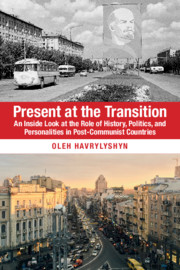 Present at the Transition
Present at the Transition from Part II - Choice of Strategy
Published online by Cambridge University Press: 04 May 2020
More than a half-century of isolation and ideological limits meant theoretical and practical knowledge of market economics was very limited. But the view exemplified by President Kravchuk of Ukraine that before reforms started one needed to train experts and managers was much overstated. In retrospect, it is clear that enough expertise was available to move forward, especially in Central Europe where many academics had exposure to Western economics. In the USSR, the numbers were indeed far lower, but these could be easily supplemented by foreign advisors –some diaspora returnees, others seconded from international organizations. Most important, the numbers of market experts needed was not large – a few ministerial and deputy ministerial positions, and heads of key departments numbered not in the thousands nor even hundreds. The best example of the limited need was the Baltics, which were among the fastest reformers with virtually no experts in market economics; a physicist Einars Repše, heading the Central Bank, was considered by international experts one of the most effective in the entire region. The chapter makes these arguments while providing an inside look at many key individuals involved, including Balcerowicz in Poland, Bokros of Hungary, Gaidar in Russia, and Pynzenyk in Ukraine.
To save this book to your Kindle, first ensure no-reply@cambridge.org is added to your Approved Personal Document E-mail List under your Personal Document Settings on the Manage Your Content and Devices page of your Amazon account. Then enter the ‘name’ part of your Kindle email address below. Find out more about saving to your Kindle.
Note you can select to save to either the @free.kindle.com or @kindle.com variations. ‘@free.kindle.com’ emails are free but can only be saved to your device when it is connected to wi-fi. ‘@kindle.com’ emails can be delivered even when you are not connected to wi-fi, but note that service fees apply.
Find out more about the Kindle Personal Document Service.
To save content items to your account, please confirm that you agree to abide by our usage policies. If this is the first time you use this feature, you will be asked to authorise Cambridge Core to connect with your account. Find out more about saving content to Dropbox.
To save content items to your account, please confirm that you agree to abide by our usage policies. If this is the first time you use this feature, you will be asked to authorise Cambridge Core to connect with your account. Find out more about saving content to Google Drive.